
Time begins the healing process of wounds cut deeply by
Time begins the healing process of wounds cut deeply by oppression. We soothe ourselves with the salve of attempted indifference, accepting the false pattern set up by the horrible restriction of Jim Crow laws.






Rosa Parks, the quiet warrior whose stillness shook an empire of injustice, once spoke with profound clarity: “Time begins the healing process of wounds cut deeply by oppression. We soothe ourselves with the salve of attempted indifference, accepting the false pattern set up by the horrible restriction of Jim Crow laws.” These words are not mere reflections of sorrow; they are the testimony of one who lived beneath the shadow of tyranny, yet refused to bow. She names oppression as a wound—not of the body alone, but of the spirit, cut so deep that generations would carry the scar. And she reveals the paradox of survival: that while time can begin to heal, too often people are forced to numb themselves with indifference, pretending peace where chains still exist.
The origin of this saying rests in the dark legacy of Jim Crow laws—the legalized system of segregation that ruled the South for nearly a century after the Civil War. These laws declared openly what prejudice whispered in secret: that Black men and women were lesser, unworthy of equal rights, unworthy of equal dignity. Buses, schools, restaurants, even drinking fountains were split by law into “white” and “colored.” Rosa Parks, weary of this humiliation, became an eternal symbol of defiance when she refused to surrender her seat on a Montgomery bus in 1955. Her quote reflects both the pain of that world and the endurance required to live within it.
To say “time begins the healing process” is not to glorify patience, but to recognize that wounds as deep as oppression cannot vanish in an instant. They require generations of struggle, remembrance, and resistance. Yet time alone is not enough. As Parks warns, too many under oppression learned to soothe themselves with “the salve of attempted indifference.” They tried to accept the false pattern imposed by Jim Crow, pretending life was normal, convincing themselves to endure. This false acceptance was a survival tactic, but it was also dangerous, for it lulled hearts into submission when the spirit yearned for freedom.
History confirms her wisdom. For decades, millions of Black Americans lived under segregation, taught to look down when insulted, to endure humiliation in silence, to “keep their place.” Some hardened themselves with indifference, for constant anger would have broken them. Yet beneath that silence burned a fire that could not be quenched. In time, leaders like Parks






AAdministratorAdministrator
Welcome, honored guests. Please leave a comment, we will respond soon